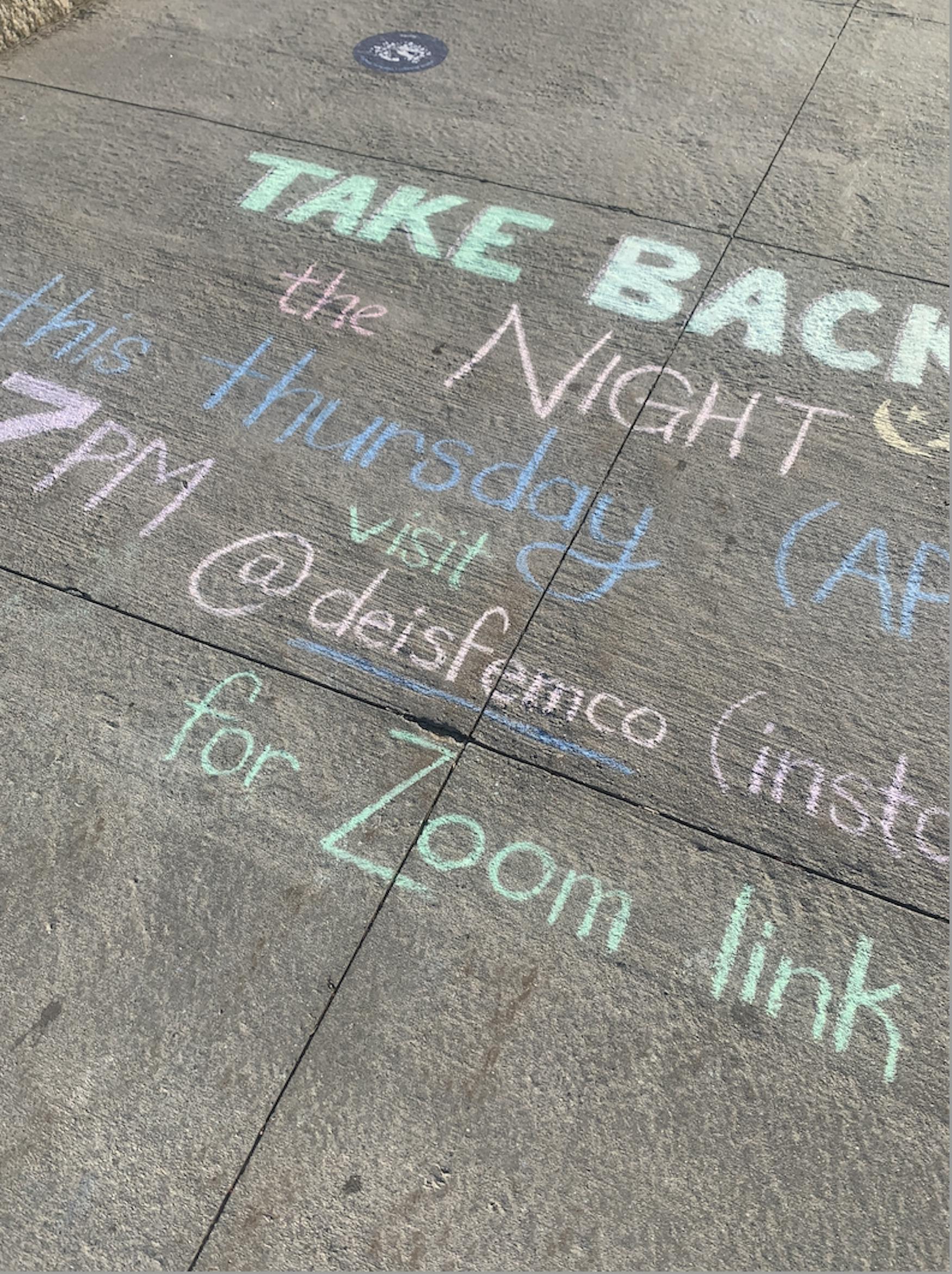Community members gather to Take Back the Night
Organizers discussed the results of the spring 2019 Campus Climate Survey.
Every year, Brandeis survivors and allies gather to raise awareness and strengthen solidarity among individuals impacted by sexual violence — to “Take Back the Night.” This year, the event took place virtually on Thursday, April 15, rather than in its traditional form of being an in-person community march.
Event organizer and Brandeis Intersectional Feminist Coalition member Kate Greenberg ’22 expressed the beneficial, albeit unforeseen, impacts of COVID-19 in relation to hosting this event. During the event’s opening remarks, Greenberg said that screens have allowed for a greater level of “conscious[ness]” for why people choose to not attend the event. People who might have chosen to not participate in previous in-person iterations of this event for fear of stigma or judgement were now given a new mode for finding community and building resilience. “You can change your Zoom name, turn off your camera, or anything else,” she said during her opening remarks. “The point, after all, is that we Take Back the Night in whatever way feels the most empowering and safest to us.”
The event consisted of opening remarks followed by three participant-only breakout rooms: action, self-preservation and reflection. Representatives from the Justice, the Brandeis Hoot and Prevention, Advocacy & Resource Center staff were not permitted to join these conversations to increase participant safety and ensure confidentiality. The virtual format also allowed students to travel between breakout rooms. Each room consisted of different activities and discussion strategies.
In the self preservation room, participants engaged in four 15-minute self-care activities that all “place emphasis on self-love, mindfulness, and grounding,” according to PARC Peer Advocate Sarah Baum ’23. In the action room, creators of the Black Action Plan Sonali Anderson ’22 and DeBorah Ault ’22 facilitated collective brainstorming about racial justice on campus and presented their own action items. The reflection room served as a space for individuals to journal and respond to prompts that related to experiences with violence.
In her opening remarks, PARC Peer Advocate Priya Sashti ’24 discussed the historical roots and various changes that have shaped the global effort to Take Back the Night. She explained that “some records suggest this tradition first began in the late 1800s, when women in England walked in protest against violence in the nighttime.” However, advocacy to bring awareness to the pervasiveness of sexual violence gained a broader range of organizations and involvement during the 1970s. At Brandeis, Take Back the Night has been an annual tradition for over seven years and “serves as a catalyst for community support against pervasive campus sexual violence,” she said.
Sashti then recognized other community works of activism at Brandeis. It was in spring 2015, through the efforts of Samantha Daniels ’16, Victoria Jonas ’15, Ava Blustein ’15 and many other students, that the Brandeis Rape Crisis Center was born. In fall 2018, the RCC and the Office of Prevention Services combined to form the Prevention, Advocacy & Resource Center, or PARC, which is now made up of 16 peer advocates and 18 violence prevention educators. “We owe PARC to those students,” she said.
Sashti also highlighted the student advocacy seen in the Ford Hall 2015 protest, intended to raise awareness of racial justice and equity, as well as the recent creation of the BAP. The BAP outlines demands for the University to take in order to become an anti-racist institution.
PARC Violence Prevention Educator and IFC member Lauren Formanski ’22 discussed the results of the spring 2019 Campus Climate survey in her remarks. “The survey demonstrated that sexual violence affects a concerning number of students at Brandeis, with 10% of men, 21% of women, and 36% of gender nonconforming students having experienced sexual assault,” Formanski said. “Students of color, trans and non-binary students, and international students are disproportionately impacted.” The climate survey also uncovered “stark disparities in access to resources,” Formanski continued. “In particular, Black and Latinx students were the least likely to feel they had adequate campus community support. The survey also found that 58% of students who chose not to report did so because they felt partially at fault, with 19% fearing retaliation, and 18% fearing they would not be believed.”
The survey, as well as other reports, likely underestimates the number of community members impacted by sexual violence, IFC member Sammi Cohen ’22 explained. She said that less than 13% of people who experience violence formally report their experiences, and some students may choose not to identify their experiences with sexual violence. This, she said, is why it is especially crucial that we support survivors and validate any experiences people chose to share.
“As Brandeis students, we do not operate outside the systems of oppression that enable violence and victim blaming,” Cohen said. We must “as a community, recognize the ways sexual violence on our campus both reflects and reinforces dyanmics of privilege and oppression, especially around race, class, gender, sexuality, ability, and more.”
Baum closed the open portion of the evening’s event by thanking all those who attended and expressed gratitude to “those who did not join us, but are still with us.”




Please note All comments are eligible for publication in The Justice.